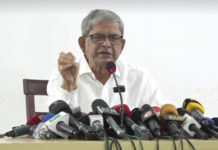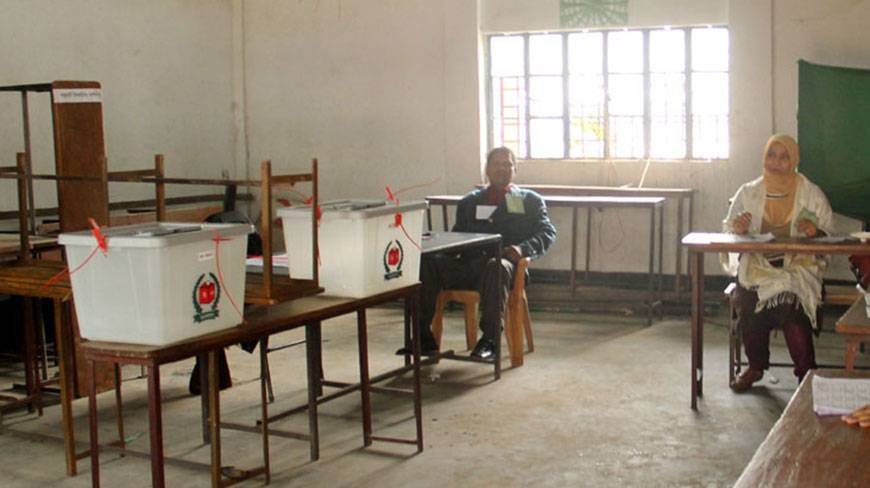Sadeq Khan
Can the coercive power of the state be solely applied to resolve a political crisis? What could be the consequences of the spiraling violence resulting from the exclusive policy, and extra-legal brinkmanship of the two leaders of the highly polarised mainstream political forces of the country? To find an answer, I have put together hereunder four comments from foreign media by Bangladesh watchers.
The common thread in those commentaries are for dialogue and a political solution. But will the entrenched leadership of mainstream politics in Bangladesh heed that advice?
AL erring not to enter dialogue
On January 8, The Times of India published a comment on its editorial page authored by Rudroneel Ghosh under the caption: “Political Turbulence: Time for Bangladeshi parties to shun political untouchability and sit for dialogue”. It noted: “The political situation in Bangladesh stands at a crucial juncture. Opposition BNP chief Khaleda Zia has been confined to her office by police and security personnel since last Saturday (at the time of writing, the office gates had reportedly been opened but law enforcement officers continued to block the entrance). The action was taken as her party had called a rally in Dhaka to mark the first anniversary of last year’s general election that BNP and its allies had boycotted.
“BNP has dubbed January 5 as ‘Murder of Democracy Day’ and it was to mark the occasion that the party had called the Dhaka rally. But Zia’s confinement has led the party to call an indefinite blockage across the country. There is no denying that BNP made a huge mistake in not participating in the last general elections in Bangladesh.
“Awami League too is erring in not initiating a dialogue with BNP. True, both morally and legislatively it is in the right. But it cannot ignore the political turmoil in Bangladesh today. BNP, even though outside Parliament, still commands a sizeable constituency. This is a fact that Awami League simply can’t wish away. Already Bangladeshi society is split right down the middle on the basis of people’s political affiliations. This is hardly healthy for Bangladeshi democracy. Riven by a bloody and turbulent history, Bangladesh needs to bridge this divide if it wants to prosper and advance.”
Violence in Bangladesh worsens
On January 14, The Wall Street Journal reported under the caption “Violence in Bangladesh Worsens,” as follows: “Antigovernment activists in Bangladesh called for intensified street protests after an opposition politician was shot late Tuesday, January 13, setting the stage for worsening political violence in the South Asian country.
“Four people, including a child, died next day morning when the bus they were riding on was firebombed by opposition supporters attempting to disrupt road, rail and river transport across the country, police said. The main opposition Bangladesh Nationalist Party, led by former Premier Khaleda Zia, has been locked in a bitter confrontation with Prime Minister Sheikh Hasina and her Awami League since the government this month banned an opposition rally and confined Ms. Zia inside her office. Since Jan. 5, in support of Ms. Zia, the opposition has used varying tactics to try to prevent people from using public transportation services.
“Police say they have rounded up hundreds of opposition activists in what they said was an effort to contain violence, which has claimed at least 15 lives in the last 10 days. The government has denounced the opposition as ‘militants and terrorists.’ BNP leaders say they have no choice but to take to the street since the government has clamped down on peaceful protest.
“On Tuesday evening, gunmen opened fire on a car carrying Reaz Rahman, a former foreign minister and a key aide to Ms. Zia. Mr. Rahman’s family said he was shot four times in the waist and legs near the Westin hotel in the center of Dhaka, the capital. The assailants fled on motorcycles after the attack, witnesses said. Doctors said Mr. Rahman was in a “serious but stable” condition Wednesday. The police said they were investigating.
In a statement, Ms. Zia blamed government agents for the attack on Mr. Rahman, calling it ‘an act of cowardice and terror.’ The government denied involvement. The U.S. condemned the attack on Mr. Rahman, calling it “outrageous and cowardly act”.
‘Deepening political violence’: OHCHR
At a press briefing on 16 January, 2015, the Office of the High Commissioner for Human Rights (OHCHR) said: “The deepening political violence in Bangladesh, resulting from the failure of the two major political parties to resolve their differences peacefully, is very disturbing…We are concerned about the potential for the violence, which already led to deaths, injury and disruption, to spiral.
Ahead of scheduled general election in January 2014 boycotted by the mainstream opposition, supporters of the country’s major parties clashed with each other and with security forces, leaving scores of people dead, hundreds injured, and causing extensive damage to property. The-then UN High Commissioner for Human Rights, Navi Pillay had sent an emissary and earnestly urged Bangladesi political leaders to set their differences aside, immediately halt the “destructive brinkmanship” and use their influence to ease the unrest.
Amid the escalating violence, OHCHR said in its press release, the “rampant use” of arson attacks on vehicles was “particularly disturbing,” citing a recent incident in which a crowded public bus was set on fire, resulting in the immolation deaths of four people including one child. The same day, a senior BNP advisor was shot at and his car set on fire.
“We urge all political parties to show restraint and to bring an immediate end to the violence,” OSCHR spokesperson said. “We also call on the authorities to ensure the prompt, impartial and effective investigation of all killings committed – irrespective of whether they were committed by State or non-State actors.”
The OHCHR spokesperson particularly urged the Government to ensure that all arrests and detentions of key opposition leaders were “not arbitrary,” and that all measures taken to restore law and order are “conducted in line with the parameters set by international human rights law, including respect for the freedoms of peaceful assembly, movement and speech.”
A preemptive crackdown
On January 16, former US ambassador to Bangladesh, now a Woodrow Wilson scholar and a keen Bangladesh watcher, wrote under the caption “An ill wind blows from the east” as follows: “This intensification of the repressive measures against all forms of opposition could signal a decision by the AL leaders (really Prime Minister Sheikh Hasina, who seems to answer to no one these days) to consolidate the AL one-party government into a one-party state before growing popular disillusion solidifies into popular resistance. If so, it probably also means a cycle of increasing repression, increasing violence, and much greater instability. The violence may have begun before this article is published. The BNP wants to hold a rally to protest government action despite the official ban on street demonstrations put in place recently by the government. Insisting on doing so would be a recipe for violence.
“Clearly, the first item on the agenda of an authoritarian minded party seeking absolute power is to destroy any opposition that can claim to be legitimate. The BNP can claim legitimacy despite its abysmally poor record when in office. Both parties have governed very badly. Rumour has circulated for a number of months that Mrs. Zia would be arrested on some charge or other, possibly on corruption, or perhaps as the Economist has suggested, on sedition. Given the control the government exercises over the courts, and the authoritarian mindset that seems to be inspiring the AL, speaking as opposition leader against the government could lead to a charge of sedition that the courts would uphold.
“One wonders, however, if the sudden crackdown on all opposition is not a preemptive move of a government that feels growing levels of dissatisfaction in the country. The AL has, it is assumed by many observers, managed to avoid popular discontent so far because the economy keeps chugging along at 5-6% growth, and poverty continues to decline, albeit at a fairly slow rate. The Prime Minister took to the media herself the other day to boast of the government’s plans for the future largely on empowering women and the underprivileged.
Heady promises for future
“One might infer that it was an effort to take peoples’ minds off the present and focus them on heady promises for the future. It is not clear to me, despite statistics that are almost always manipulated to make the government look better than it is, that the economic outlook is as rosy as many predict, especially in the rural areas. In any case, it is possible that Sheikh Hasina’s legitimacy may not be as solid as she thought it was, and she may have decided to hammer the opposition on the one hand and offer up bucolic visions of the future on the other to the masses.
“With most of the opposition locked up or clammed up or bought up the only voices of dissent I see in the English language press are from the Bangladeshi Diaspora – it is not certain that she can be stopped. The international community seems inclined to look the other way, perhaps believing that Bangladesh is a lost cause for democratization. India, which stands to lose most if instability becomes chronic and dysfunctional, seems unconcerned now. This, in itself, is a disincentive for those in Bangladesh who are opposed to the AL’s authoritarian ways to step up and voice dissent. Can the West, and will it try to, keep them out of jail and out of harm’s way?
Model of autocratic democracy?
“As one wag recently wrote that Sheikh Hasina has trained the Awami League ‘in the art of bullying, bashing, muzzling free voice, thuggery (sic.), creating and abolishing movements (like the Shahbag movement), creating an opposition party that is a part of her government and [whose leader] sits in her cabinet and votes in favor of the ruling party…’. She has, this anonymous writer says, created the ‘world’s first model of autocratic democracy’. (I note the author of this send up did not sign his name to the article. I also note that the BNP wasn’t bad at these same skills when in power.)
My guess, however, is that the democratic elements of civil society and the opposition parties will not bow down without a fight. Sooner or later, in the absence of a peaceful turnover of government, there will be violence and it may be pretty serious. We may regret our indifference. Among the other unwanted consequences of violence is usually an army takeover.”
Source: Weekly Holiday









